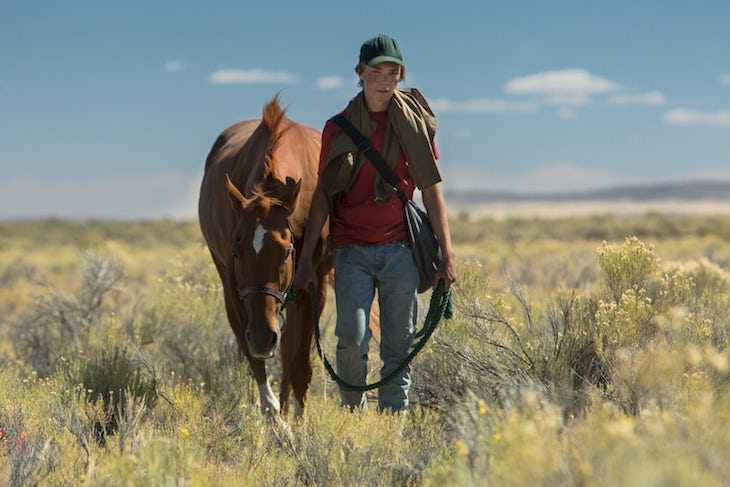Andrew Haigh makes inaction films. Weekend (2011) tells of two young homosexuals getting to know each other in Nottingham. In the wintry marital drama 45 Years (2015) two old heterosexuals get to unknow each other in Norfolk. The canvases are miniature, the resonances crevasse-deep. His third film, Lean on Pete, brings a change of scene and scope. And volume. Hooves thunder. A fatal gunshot goes off. Ornery men bawl and holler. There is a devastating road accident, and a climactic act of hideous violence. It’s as if Haigh has contracted ’roid rage. What he’s actually done is get on a plane to Oregon to adapt a novel by Willy Vlautin.
Haigh is intrigued by the often silent space between two characters. Here the two characters are Charley Thompson (Charlie Plummer), a friendless and latterly homeless teenager, and a horse. The knackered old non-thoroughbred racer is, for reasons unexplained, called Lean on Pete, and Charley does lean on him for an emotional sustenance that humans cannot be relied upon to provide.
Chief among these is his father Ray (Travis Fimmel), a rackety lothario who cooks for a living but omits to stock his own fridge. The mother has long vanished. Charley is so uncertain of his domestic status that he asks his dad’s latest squeeze if he’s allowed a glass of water. He’s a good boy. He picks up litter. He doesn’t complain at his abandonment. He jogs. One day he jogs past a stable where an old crank called Del (Steve Buscemi) offers him shifts as a stable lad. There Charley buddies up with Lean on Pete, whose thrilling companionship plants a rare goofy smile on his sweet but impassive, defended face.
Del is another of Buscemi’s scowling, scrapping lowlifes — ‘sometimes I want to punch myself in the face if I see another horse’, he says. The survival instinct teaches him to spurn sentiment. It’s not a life lesson Charley can willingly ingest, even when the softer, kindlier jockey Bonnie (Chloë Sevigny) repeats that Lean on Pete is no pet. But the horse will only escape being sold to a Mexican slaughterhouse if illegal stimulants keep him winning on Oregon’s low-rent race circuit. So Charley embarks on a desperate effort to preserve him.
By now Charley has lost his father, fatally wounded by a cuckolded Samoan, and his only hope of salvation is to make his way to a long-lost aunt way off in distant Wyoming. Devotees of Huck Finn may detect a homage. The film assumes the random, disjointed shapelessness of a road movie. The orphaned Charley has nothing but his wits to fall back on, and must hope for the kindness of strangers who between them represent various stripes of American pathology — army veterans who nonchalantly recall mutilations in combat; addicted hobos; an obese teenage girl deprived of love who tells Charley, ‘When you don’t have anywhere else to go you’re kinda stuck.’ Perhaps even the condemned Lean on Pete is a symbol of evanescent American heroism. With only Pete to listen, Charley one-sidedly reminisces about better times at his old school in Spokane, Washington, when he was on the football team and went to friends’ houses — the hoarded shards of a lost paradise.
The camera stalks Charley like a shadow. At his very loneliest it rears back to put him in his place: a solitary dot in the vast northwestern nowhere bordered by heedless peaks. After a while you begin to regard the script as an exercise in remorseless Hardyesque sadism and long for the glimmer of redemption. Haigh, as is his wont, is a parsimonious storyteller who plants key details in the corner of the screen. Take the first scene, when his dad’s new girlfriend cooks breakfast. We see her hands at the hob. Then, when she walks across shot, it’s revealed she’s still in her underwear. Only as she leaves is her face discovered. She’s a disembodied nobody but her glancing impact on Charley’s future is incalculable.
Charlie Plummer, a skinny blond wisp, shoulders Charley’s story of yearning and despair with extraordinary skill. On his picaresque trek from blue-eyed innocence to dirt-smudged experience he often keeps his cards close to his chest, saying little or nothing, only to be provoked into explosions of extreme emotion. The horse, snorting and stamping, also gives a highly charged performance. Lean on Pete is a beauty. Giddy up and go.






Comments